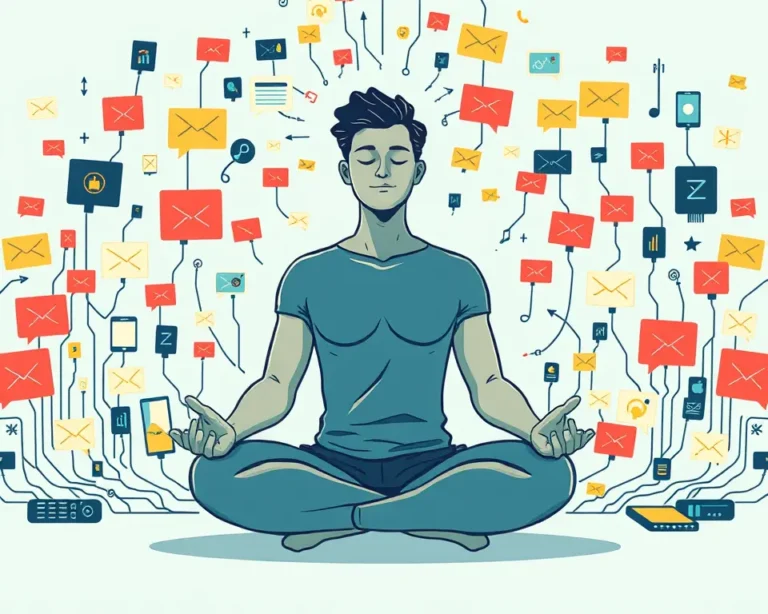In today’s relentlessly paced and digitally saturated world, the ability to focus feels like a superpower slipping from our grasp. Constant notifications, a never-ending stream of information, and the pressure to multitask have eroded our attention spans, leaving many feeling mentally drained and scattered. But just as physical fitness strengthens the body, mental fitness offers a proactive approach to sharpen cognitive function, build resilience against distractions, and cultivate a focused, clear mind.
The Shrinking Attention Span: A Digital Age Crisis?
The statistics paint a concerning picture. Research indicates a significant decline in human attention spans over the past two decades. Some studies suggest that the average attention span has plummeted from 2.5 minutes to a mere 47 seconds when using a digital device. Others suggest that attention spans have shrunk from 12 seconds in 2000 to a mere 8 seconds in 2015. This decline is attributed to the constant stimulation and task-switching demanded by our digital lifestyles.
The Science of Distraction
The human brain is naturally drawn to novelty and change, a trait that has historically aided our survival. However, in the modern information age, this inherent desire for stimulation can become a liability. Each time we switch tasks – whether it’s responding to an email, checking a social media notification, or answering a text – we engage in “task switching,” which consumes valuable mental energy and reduces overall efficiency.
Distractions can also impair cognitive control, which limits the brain’s ability to effectively manage focus, make sound decisions, and regulate emotions. This can lead to impulsive choices and emotion-driven reactions, further hindering productivity and well-being.
What is Mental Fitness?
Mental fitness encompasses practices and habits that maintain and improve our cognitive functions. It’s about proactively building resilience against distractions and nurturing the brain’s capacity for focus, creativity, problem-solving, and emotional regulation. Just as physical exercise strengthens muscles and improves endurance, mental fitness exercises strengthen neural pathways and enhance cognitive abilities.
While mental health focuses on addressing conditions like depression and anxiety, mental fitness aims to cultivate positive attributes such as focus, clarity, creativity, resilience, and emotional balance. By prioritizing mental fitness, individuals can mitigate the negative impacts of stress and distraction, enhance their daily experiences, build stronger relationships, and experience greater fulfillment.
The Benefits of a Fit Mind
Investing in mental fitness yields a wide range of benefits that extend to all aspects of life:
- Improved Focus and Concentration: Mental fitness exercises strengthen the brain’s ability to sustain attention, making it easier to concentrate on tasks and resist distractions.
- Enhanced Memory and Cognitive Function: Regular mental workouts can improve memory recall, processing speed, and overall cognitive function.
- Increased Creativity and Problem-Solving Skills: A mentally fit mind is more flexible and open, fostering creativity and enhancing problem-solving abilities.
- Better Emotional Regulation: Mental fitness practices can help individuals understand and manage their emotions more effectively, leading to improved relationships and reduced conflict.
- Increased Resilience: Building mental fitness equips individuals with the tools to bounce back from setbacks and challenges with greater ease and strength.
- Reduced Stress and Mental Fatigue: By developing mindfulness and focus, individuals can better manage stress and reduce mental fatigue.
- Improved Sleep Quality: A calm and focused mind promotes better sleep quality, which is essential for overall health and cognitive function.
- Stronger Sense of Purpose: Engaging in mental fitness activities can help individuals clarify their values and goals, leading to a stronger sense of purpose and direction in life.
- Increased Confidence: With improved cognitive function and emotional regulation, individuals often experience increased confidence and self-esteem.
Strategies for Staying Sharp in a Distracted World
Fortunately, mental fitness is not an innate trait but a skill that can be developed and strengthened through consistent practice. Here are some effective strategies for cultivating a sharper, more focused mind in today’s distracting world:
1. Mindfulness Meditation
Mindfulness meditation has gained significant popularity as a powerful tool for enhancing mental fitness. Studies have shown that as little as 15 minutes of daily mindfulness practice can improve attention, working memory, and recognition memory.
- How to Practice: Find a quiet space, sit comfortably, and focus on your breath. Observe your thoughts and feelings without judgment, allowing them to pass without getting carried away. Popular techniques include deep breathing exercises and body scanning.
2. Time in Nature
Spending time in nature has been shown to reduce anxiety and boost mood.
- How to Practice: Take a daily walk in a park, garden, or any green space. Research reveals that spending time in nature can lead to lower levels of cortisol, a stress hormone, and an enhanced sense of well-being.
3. Single-Tasking
Contrary to popular belief, multitasking reduces efficiency and increases errors.
- How to Practice: Adopt single-tasking – focusing on one task at a time – can improve productivity and satisfaction. The Pomodoro Technique involves working in 25-minute focused intervals followed by short breaks.
4. Cognitive Exercises
Engaging in cognitive exercises challenges the brain and promotes mental fitness.
- How to Practice: Incorporate activities such as crossword puzzles, Sudoku, memory games, and learning new skills into your routine.
5. Physical Exercise
Exercise benefits not only the body but also the mind.
- How to Practice: Incorporate at least 30 minutes of moderate exercise like walking, cycling, or swimming daily. Exercise has been proven to increase the size of the hippocampus, a brain area involved in memory and learning.
6. Prioritize Sleep
Adequate sleep is crucial for cognitive function and mental fitness.
- How to Practice: Aim for 7-8 hours of quality sleep each night. Establish a regular sleep schedule and create a relaxing bedtime routine to promote restful sleep.
7. Limit Screen Time and Manage Notifications
Excessive screen time and constant notifications can overwhelm the brain and impair focus.
- How to Practice: Set boundaries for screen time, especially before bed. Turn off non-essential notifications and designate tech-free hours. Smartphones have many tools for blocking distracting websites and setting time limits.
8. Practice Gratitude
Cultivating gratitude can boost positive emotions and improve overall well-being.
- How to Practice: Keep a gratitude journal and write down things you are thankful for each day. Expressing gratitude can shift your focus from negative thoughts and enhance your sense of happiness.
9. Social Connection
Socializing and connecting with others can combat loneliness and improve mental fitness.
- How to Practice: Schedule regular time with loved ones, join social groups, or volunteer in your community. Meaningful social interactions provide support, reduce stress, and enhance cognitive function.
10. Continuous Learning
Learning new skills and expanding your knowledge base challenges the brain and promotes cognitive growth.
- How to Practice: Take a class, learn a new language, or pursue a hobby that interests you. Continuous learning keeps the mind active and engaged, fostering mental fitness and resilience.
Making Mental Fitness a Habit
Just like physical fitness, mental fitness requires consistent effort and dedication. By incorporating these strategies into your daily routine, you can cultivate a sharper, more focused mind and thrive in today’s distracting world. Start with small, manageable steps and gradually increase the intensity and duration of your mental fitness exercises. Remember that consistency is key, and the long-term benefits of a fit mind are well worth the investment.







